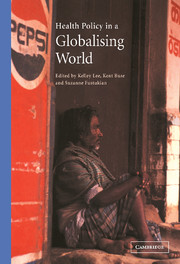Book contents
- Frontmatter
- Contents
- List of figures
- List of tables
- List of boxes
- Notes on contributors
- Foreword
- Preface
- Acknowledgements
- Abbreviations
- Part I
- 1 An introduction to global health policy
- 2 The public health implications of multilateral trade agreements
- 3 Globalisation and multilateral public–private health partnerships: issues for health policy
- 4 Global approaches to private sector provision: where is the evidence?
- 5 Regulation in the context of global health markets
- 6 Global policy networks: the propagation of health care financing reform since the 1980s
- 7 The globalisation of health sector reform policies: is ‘lesson drawing’ part of the process?
- 8 Cost-effectiveness analysis and priority-setting: global approach without local meaning?
- Part II
- Part III
- References
- Index
- References
5 - Regulation in the context of global health markets
Published online by Cambridge University Press: 22 September 2009
- Frontmatter
- Contents
- List of figures
- List of tables
- List of boxes
- Notes on contributors
- Foreword
- Preface
- Acknowledgements
- Abbreviations
- Part I
- 1 An introduction to global health policy
- 2 The public health implications of multilateral trade agreements
- 3 Globalisation and multilateral public–private health partnerships: issues for health policy
- 4 Global approaches to private sector provision: where is the evidence?
- 5 Regulation in the context of global health markets
- 6 Global policy networks: the propagation of health care financing reform since the 1980s
- 7 The globalisation of health sector reform policies: is ‘lesson drawing’ part of the process?
- 8 Cost-effectiveness analysis and priority-setting: global approach without local meaning?
- Part II
- Part III
- References
- Index
- References
Summary
Introduction
Marketisation and globalisation are phenomena that have recently characterised health sectors around the world. Marketisation refers to the use of market mechanisms to finance and provide health services (Hsiao 1994). Globalisation can be described as the ‘process of increasing economic, political, and social interdependence and global integration that takes place as capital, traded goods, persons, concepts, images, ideas, and values diffuse across state boundaries’ (Hurrell and Woods 1995). Marketisation and globalisation have been contributing to the emergence of a range of global markets for health-related goods and services. This has led to widespread interest in the role regulation can play in structuring positive benefits and minimising negative consequences from this private sector activity.
This chapter explores the nature and development of marketisation in global health. It reviews the changing role of regulation needed in the health sector, and then considers the potential role of regulation within a globalising context. A case study of the World Trade Organisation and its relationship to the pharmaceutical sector is used to highlight the global–national linkages and difficulties of formal regulation. We conclude by considering the scope for regulatory action in the context of global markets and the nature of alternative mechanisms that can be used.
Marketisation and the emergence of global markets within the health sector
For many low- and middle-income countries (LMICs), the main change in the health sector post-independence has been movement from public sector dominance of health care provision and financing to one where there are substantial levels of private sector activity.
- Type
- Chapter
- Information
- Health Policy in a Globalising World , pp. 78 - 96Publisher: Cambridge University PressPrint publication year: 2002
References
- 1
- Cited by



